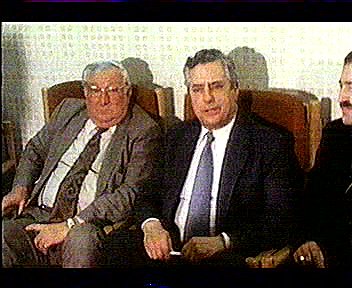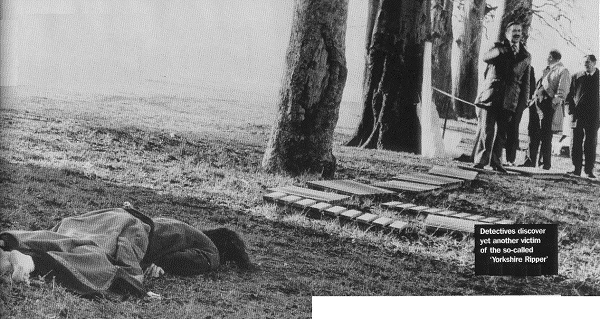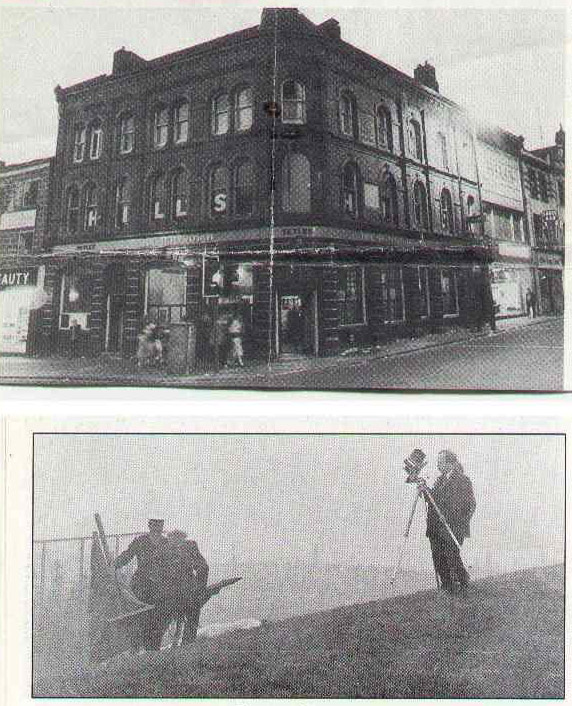December 22, 2008
UNBURY OUR GHOSTS!

The West Yorkshire police press conference after Sutcliffe's arrest in January 1981
Marcello Carlin responds to my most recent David Peace post:
- Nineteen Eighty in particular I also found a key book since it took me back to the North of England through which I travelled, from Glasgow down to Oxford for my entrance interview, on Monday 8 December 1980 (it was my mum’s birthday) – pouring with rain and oily blackness, Warrington indistinguishable from Penrith, an encroaching and then unrelenting dark which bore the residue of foretold apocalypse, all of it stained with what was going on with the Ripper and everything else. And the records of that time seemed to carry that coagulated, wine-coloured blood within them; think of UB40’s “The Earth Dies Screaming,” the 45 of the Specials’ “Do Nothing” whose string synth (played by Pete Waterman and not a lot of people know THAT!) tied it firmly to “Atmosphere,” even the sepulchral echo that Dave Edmunds slapped on “Runaway Boys” by the Stray Cats – this reflected the dying, two-dimensional, yet to be reborn Glasgow but also Afghanistan, and the endless darkness…
(my big record of the time was The Hapless Child, Mike Mantler's adaptation of Edward Gorey, sung by Robert Wyatt, which is the nearest equivalent to DP in music I can think of outside 1980 Leeds or Manchester...)
I woke up in Oxford – a misty and practically invisible Oxford – on the Tuesday morning (yes, I felt like McGoohan stumbling to the window and seeing Portmeirion instead of Stag Place SW1), switched on the trusty transistor radio, heard the news and everyone was in a daze; not an especially grieving one – more a bemused one, a “where the hell do we go now?” one…but I’m rambling already…
(and of course "Who is Number One?" may = "Where is this God that shall deliver us from processed, smiling self-torture?")
...Peace’s work strikes me as a howl of hope – UNBURY OUR GHOSTS! – and strangely enough The Damned Utd (set in a parallel Nineteen Seventy Four) provides the exit door; Clough goes but we know he’s going on to greater things rather than damnation (though I’d love to read DP do one on Keane and Sunderland in the fullness of time)…there is hope and DP’s cry is one that’s on the side of life, which is why I think the kneejerk comparison with Ellroy doesn’t work; Ellroy sneakily loves the destruction he wreaks and his heart is with the Pete Bondurants of this world, the reckless freebooting right-wing if they could be bothered to vote “adventurers” who never realise that they’ll always be slaves.
December 16, 2008
The voice of Weird paternalism
The Master enjoys the Clangers: Dr Who 1972
- "Stuff your bird or whale song, forget about breezes in cornfields or lapping waves and waterfalls: there is no more calming sound in the world than the voice of Oliver Postgate. ... It floated above all these stories, that voice; wound its way through them. It was the kindest, wisest voice you ever heard, and now it's gone.
As have all the other sounds, which you'll now hear in your mind's ear as I mention them in turn: Ivor's pshht-a-coo engine mechanics; the Clangers' whistles; Bagpuss yawning; Gabriel the toad swallowing; professor Yaffle climbing down from his bookend to inspect some new artefact; the squealing mice. All gone now, too."
Charlie Brooker on Oliver Postgate. Brooker is of course right to highlight Postgate's voice, though I'm not sure 'calming' quite captures its peculiar affective quality. Postgate's voice was certainly possessed of an eerie serenity, yet this was always coloured by something that resembled melancholy but which never came close to worldweariness; it was authoritative without being remotely self-satisfied, paternalistic but not fatherly; quietly entrancing, gently lyrical. It held open the possibility of a wisdom that had nothing to do with deflationary commonsense. This was the voice of an adult speaking to children; an obvious point, no doubt, but where in children's TV now would you find such a mode of address? There are no children, there are no adults, there is no wonder: only adolescents in waiting, being spoken to by screamingly selfconscious adolescents in their twenties and thirties.
Postgate's dream paternalism is another example of the way in which public service could incubate the strange. The fact that Postgate and Firmin made their shows in a converted cowshed is significant less because of the homemade, handcrafted quality it lent to their animation and puppetry than because it allowed them to work independently, far away from the normalising, metropolitan pressures of demographics and focus groups. Watch Bagpuss or The Clangers now, and what you see is not the kitsch that clipshow chitchat leads you to expect, but something Weird. Even though it is liable to be described as 'quintessentially British', Bagpuss looks as if it might just as well have come from Eastern Europe. The bizarre, piping folk music and oneiric atmosphere hail from a Weird England, which although it comes from the near past, is now irretrievably foreign. All gone...
December 03, 2008
'Can the world be as sad as it seems?': David Peace and negative theodicy

- "Faced with the terrible brutality in these books - and again, this isn't a particularly popular idea at the moment - I strongly think you have to believe in God, that there's something better within us all and something worth saving that will triumph in the face of whatever you're put through."
- - David Peace, interviewed in New Statesman, 2001
Rereading David Peace's Red Riding Quartet (three of which have just been filmed by Channel 4), it seems to me that the four books constitutes not so much a negative theology as a negative theodicy. The religious elements in the books become increasingly foregrounded as the Quartet develops, until the deeply ambiguous, hallucinatory ending of Nineteen Eighty Three becomes a quasi-Gnostic treatise on evil and suffering. The final section of the novel, "Total Eclipse Of The Heart" (that transfiguration of pop cultural reference into epigraph being one of Peace's signature techniques) explicitly posits the idea that, far from undermining the existence of God, evil and suffering entail that God must exist. Eclipse implies something that is eclipsed, a hidden source of light that produces all this shadow. It resembles Kant's moral argument for the existence of God, which is, in effect, an inversion of the problem of evil. The problem of evil maintains that suffering, particularly suffering visited upon the innocent, means that the theistic God could not exist, since a benevolent, omnipotent and omniscient being would not countenance undeserved suffering. With his inventory of wretched child abuse cases, Dostoyevsky's Ivan Karamazov makes the most famous, and most passionate, statement of this position. Yet if there is no God, the suffering remains, only now there is no possibility of its expiation; if there can no justice to come, the universe is permanently blighted, irrevocably scarred by atrocity, abuse and torture. Kant's solution relies upon an argument from longing: our yearning for justice insists that this cannot be enough, that appalling suffering cannot go unexpiated. There must be justice, and only God is in the position to deliver it.
All of these themes are touched upon in Dominic's recent post on Meillassoux and Divine Inexistence. (See also this on Speculative Heresy.) Meillassoux's solution to the problem of evil is a God-to-come: a God who has not been tainted by responsibility for causing and/ or permitting suffering, but who has the power to resurrect (and reward) the dead.
Peace, who has said that he aimed to produce a Crime fiction which is no longer entertainment, has written Crime works that are hauntological in a double sense. The Crime genre is of course well suited to explore the (moral, existential, theological) problems posed by Meillassoux's “odious deaths”: the deaths "of those who have met their end prematurely, whose death is not the proper conclusion of a life but its violent curtailment"; and as they moved away from the uneasy combination of fanciful genre trappings, period signifiers, Angry Young Man homage and brutality that characterised Nineteen Seventy Four, the novels of the Red Riding Quartet were simultaneously drawn towards actuality and theology, as if the proximity of the one entailed the other. Readers are put into the position of spectral mourners by the voices of those who have died odiously, the Ripper's victims, heard in the visionary "Transmissions" which preface each of the chapters in Nineteen Eighty, sections which precisely combine the actual (gleaned from reportage and biography) with the spectral.

The novels are hauntological in another sense, a sense that is closer to the way in which we have used it in relation to music, but not quite the same. Peace is not at all interested in the problems of degraded memory which preoccupy The Caretaker, Burial or Basinski. His is a past without crackle, rendered in the first person in a tense that is very nearly present. The occlusions in the narrative are due, not to faulty recording devices or memory disorders (cultural or personal) but to the self-blindings of his characters, who see themselves (and the events of which they are a part) only through a glass darkly. In the end, everything - narrative, intelligibility - succumbs to total murk; as the characters begin to disassociate, it becomes difficult to know what is happening, or what has happened; at a certain point, it is unclear as to whether we have crossed over into the land of the dead.
The libidinal orientation towards the past is also markedly different in the case of Peace and sonic hauntology: whereas hauntological music has emphasised the unexplored potentials prematurely curtailed in the periods it invokes, Peace's novels, as we have seen, are driven by the unexpiated suffering of Yorkshire at the end of the 70s. And Peace's writing is also hauntological in its intuition that particular places are stained by particular occurrences (and vice versa). As he has insisted in many interviews, it is no accident that Sutcliffe was the Yorkshire Ripper. Whereas hauntological music interrogates nostalgia, Peace's books are avowedly anti-nostalgic: counterparts to Life On Mars, perhaps, with its ambivalence towards police brutality (and its media representation). There is no such vindication in Peace's novels, no suppressed yearning for a time in which coppers could beat suspects with impunity. After all, it is corruption, rather than criminality per se, that is the focus of the Red Riding Quartet.
Music in Peace's books functions as a hauntological trigger. He's remarked that he uses music, including music he doesn't like, to take him back to the feel, the grain, of a period. Musical references are embedded in the text either diegetically, as background sound, or more esoterically, as cryptic-epigraphic ciphers and repeated incantations: a portal effect going that gratifyingly echoes (in reverse) the way in which music of the 1970s, especially postpunk, would direct listeners to fiction. (Reading the books alongside Tom Ewing's Popular just now makes for some interesting juxtapositions since Popular has reached the core chrono-zone of Peace's quartet - Nineteen Eighty is shadowed by Lennon's death, and this one makes it into Nineteen Seventy Seven, its disco chirpiness oddly congruous with Peace's landscape of vice and sleaze.) As others have noted, Nineteen Eighty is haunted in particular by Throbbing Gristle, especially the phrase that they took from another killer, Charles Manson: "can the world be as sad as it seems? " In Peace's hands, this question becomes an urgent theological enquiry, the very relentlessness of the sadness and misery he recounts calling forth an absent God, a God who is experienced as absence, the great light eclipsed by the world's unending tears. The deeply ambivalent TG-esque preacher Reverend Laws (who, TG-like, replaces "I" with "E" and "the" with "thee") may be the one who can put us in touch with this God, the Abandoned Christ who is himself forsaken, the redeemer who is not the creator. But the world, the sad, desolated world, is full of angels whose wings have either been shorn off, reduced to stubble, or which have grown into gigantic, dirty monstrosities... addict angels hooked on alcohol, casual but incessant lusts, and the trash of the consumer society that is struggling to be born out of the wreckage of the Fordist social consensus... angels whose ultimate response to the world is puking (everyone pukes in Peace's books), throwing up the whiskies and the undercooked crispy pancakes, but never being able to purge any of it, never being able to take flight.